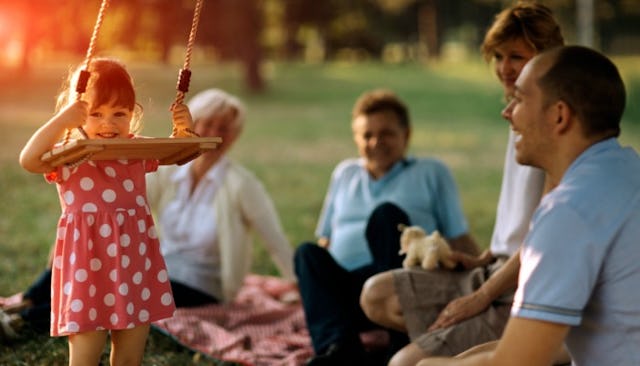Why I Want My Kids To Talk To Strangers

If you don’t know me, and you don’t know my kids, but you still somehow feel at ease to smile at, wave to, speak to, or otherwise interact with my kids, I have a couple of words for you…
Thank you.
Thank you for not thinking of us as “strangers,” because I don’t think of you that way, and I’m not raising my kids to think of you that way either. Even if you somehow convince us that you’re actually stranger than we are—maybe especially then—we’ll carry on thinking of you as “neighbor” or “community member,” you know, a person.
When you smile at us, you help me remember that the small child dashing away from me toward yet another effing mud puddle (with only one shoe on, somehow) while laughing maniacally is actually pretty funny, maybe even sort of delightful. From certain perspectives, that is.
When I see you appreciating them, you remind me to do the same. And your grins, waves, greetings, and comments make their world a friendlier place.
I love when my kids wave back at you, and how our 4-year-old daughter can strike up conversations with you, playground parents/grandparents/babysitters, and even you, slightly ragged, clearly hungover couple trying to nap in the shade that time my daughter woke you up to offer you carrot sticks. (Sorry about that, and thanks for listening to her monologue while I chased after her puddle-jumping maniac brother.)
Yes, there are dangerous people out there. Hell, maybe you’re even one of them. Maybe! That’s why it’s good that my kids, at 4 and 2, have several more years of constant direct supervision by a trusted adult to endure before getting more rope.
During this time, I’m trying to teach them to trust their instincts and not to respond to anyone, even you, who makes them feel uncomfortable (I find toddlers are actually pretty good at that), not to accept anything from you and never to go anywhere with you. Not that it matters yet. They are 4 and 2; I’m right here watching.
And during this time, for better or worse, I’m also teaching them by example. I want my kids to talk to strangers. I want them to know that they deserve our respect and a basic minimum of trust unless they demonstrate otherwise. Sure, sometimes a person just gives you the willies for no good reason and maybe that’s your instinct, if it’s not bigotry. I’m still trying to discern the difference, and I’m trying to teach my kids to do the same.
I’m also frightened and grief-stricken by reports of violent child abduction by strangers (even though they are statistically exceedingly rare). But I maintain that the answer is not for families to contract into themselves and view all unknown persons as separate and suspect. Because my more proximate fear is that such a response divides communities and foments open hostility. It nourishes a culture in which a mother can berate a father she doesn’t know in Walmart for using food stamps in front of both of their children.
Luckily, most people are not assholes. And according to crime stats, children are now safer than they’ve been in decades, and most people are also not dangerous. Sure, stats vary from place to place. And maybe I’m naive, but no matter where I go, I seem to get better results treating people with trust and respect than with knee-jerk suspicion.
So, while trust and respect can be misused, I won’t teach my children to preemptively fear you along with every other person they haven’t met yet because that’s pretty much everyone. And on a global scale, that’s mainly people who look and live differently than we do.
Again, sometimes someone will trigger my kids’ mistrust for reasons they don’t fully understand. They should listen to that first, but also examine it later. And being neighborly does not mean always deferring to others. I also want my kids to be assertive, autonomous individuals.
Let’s just say suspicion by default is pretty high on the list of things I want my kids to avoid. Because as that woman’s viral Walmart outburst demonstrates, undue, reflexive fear leads to anger, and anger to hate, and hate…well, you know the rest. Or you should, because Yoda was right.
This article was originally published on